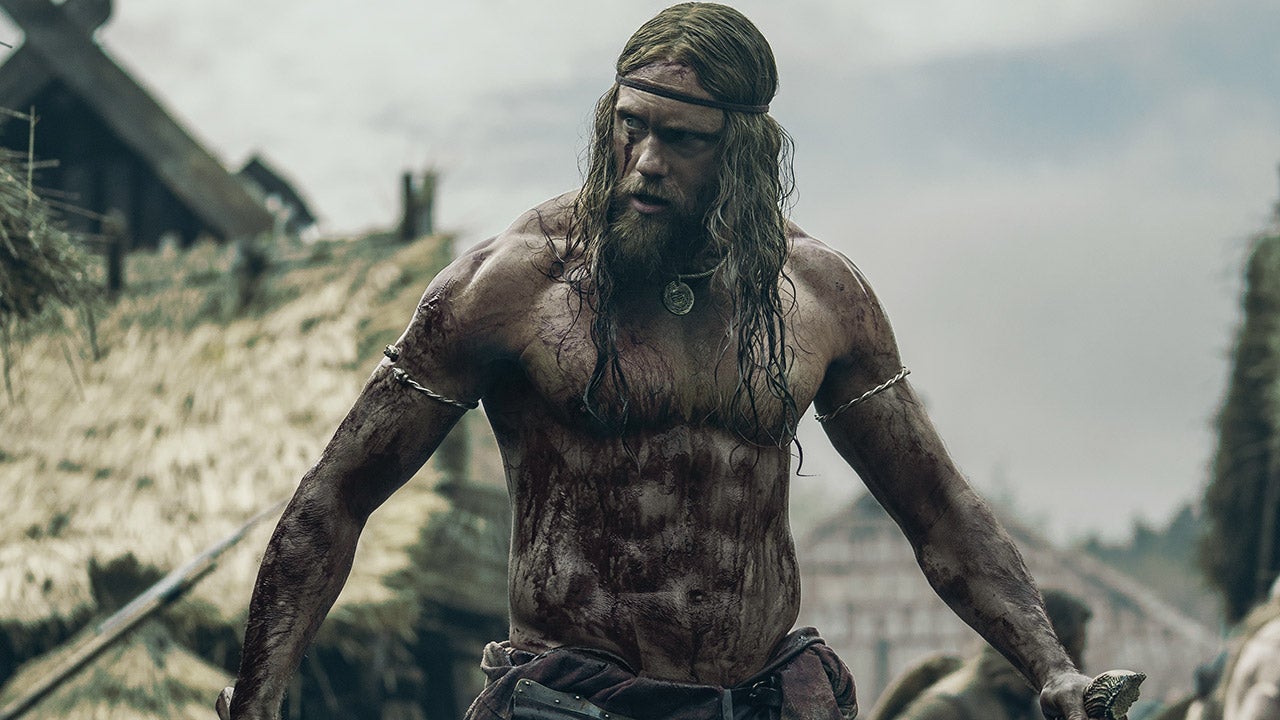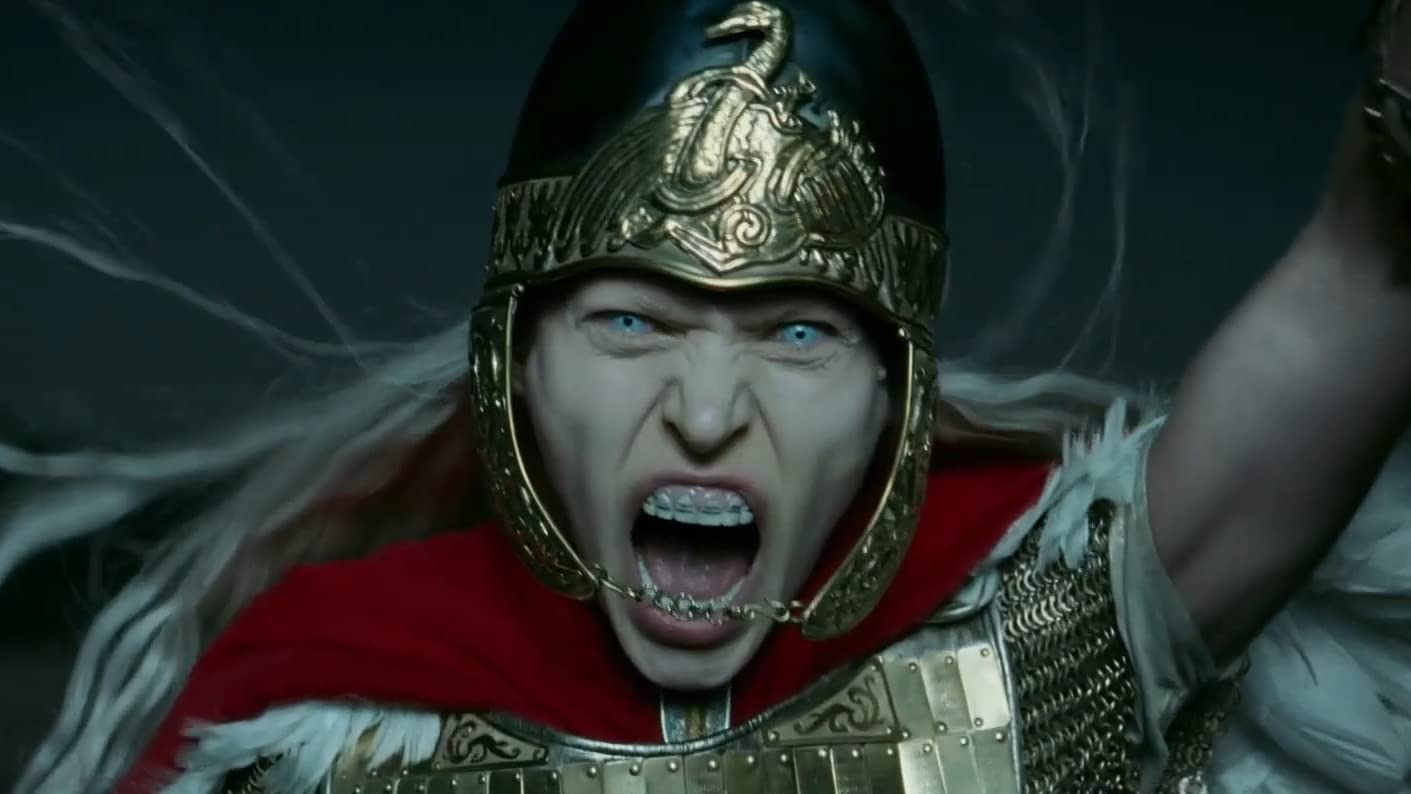Audiences are no doubt somewhat familiar with the story of Hamlet, which has been adapted a number of times over the last several decades. In the most basic terms, the protagonist's father is murderously dispatched by his traitorous uncle to win the crown of a kingdom. Often, his mother is willingly or unwillingly trapped in the confines of this kingdom and is believed to be in need of rescuing. The screenplay of The Northman as written by Eggers and Icelandic poet Sjón follows this basic premise. Amleth is the 10-year old son of King Aurvandill War-Raven (a mercurial Ethan Hawke), who dotes on him, and Queen Gudrún (Nicole Kidman), who doesn't seem to love her son as much as he loves her. She does seem to have eyes for Aurvandill’s duskily handsome brother, Fjölnir the Brotherless, which does not go unnoticed by the wonderfully crude court jester, Heimer the Fool (Willem Dafoe).
The king, believing his death to be near, chooses to spend a night bonding with his son. In Viking terms, this naturally means descending into some earthen cavern illuminated by greasy torches, getting supremely stoned, crouching down on all fours and howling at the moon like wild beasts, and getting to stick your unsterilized hand into your father's open wound in order to see your entire family tree. The next morning, Aurvandill is ambushed by a group of men, sniping him from a distance with arrows before Fjölnir arrives to personally hack off his brother's head. Amleth manages to flee from Fjölnir’s men, who intend to send him the way of his father, but not without witnessing his mother carried off by Fjölnir as a trophy. As he continues his escape off the island by way of perpetually tempestuous Scandinavian waters, tears intermingled with salty brine, he vows that he will avenge his father, save his mother, and kill Fjölnir. Wasting no time establishing the premise, Eggers cuts us two decades into the future, where the real story begins.
Amleth is now played by a staggeringly ripped Alexander Skarsgård and has grown into an uncompromising beast roughly the size of a tank. Eggers does away with the Victorian melodramatic tendencies of Hamlet, who possesses the ever-tormented psyche of an angsty teen. This version of the protagonist has been so stunted by familial trauma that he compensated for it by developing an insatiable appetite and an abnormally stomach-churning ability for wrangling bloody death from the earth upon which he walks. We first see Amleth and his Viking companions mercilessly invade a village settlement in the Land of Rus, where they make no distinction between man, woman, and child. In an outrageously grim long take, Eggers films Amleth literally ripping a spear out of the air and hurling it back through its owner more than 150 feet away, just as a start.
Frequent collaborator Jarin Blaschke lends his monochrome expertise once again to Eggers’ minatory landscapes. The vistas of Northern Europe and Iceland seem so starkly execrable as to have been forged by the pagan gods whom plague Amleth’s waking dreams. Björk shows up as one such character, although it’s never entirely clear what she is. What is certain is that she is no mortal. As Amleth walks through the ruins of the pillaged village caked in mud, sweat, and blood, she appears to remind him that it is time to fulfill his duty as a Viking prince and avenge his father. Amleth is no stranger to his destiny; he has been awaiting this day for a long time. He abandons his savage brethren, brands himself with a hot iron, and sneaks aboard a slave vessel headed directly to a serfdom ruled by his uncle. He learns that shortly after usurping the throne, Fjölnir lost the kingdom to invaders, and has settled into a more peaceful life as the ruler of a small village. Gudrún remains at his side, as do two sons by her new husband: the sniveling Thorir the Proud (Gustav Lindh) and the preteen Gunnar (Elliott Rose), who is the spitting image of Amleth himself at that age.
As Amleth makes the treacherous journey through uncompromising Icelandic waters, he finds himself an unlikely ally: a willowy, silver-haired slave maiden named Olga (Anya Taylor-Joy), who possesses some capability for sorcery. If he is making plans to leave the island, she wants in and is more than willing to assist him in his schemes of revenge, so long as they end in evacuating the island. However, Amleth’s vengeance is not a personal one. He is compelled by the strings of fate, acting purely as a tool of karmic retribution wielded by the heavens, a force which finally calls for a reckoning of Fjölnir’s crimes. Until the pre-ordained time, the prince cannot take decisive action.
When destiny does beckon for him, he steals away from the serfdom to enquire what his commands are. When can he kill his uncle? The answer is not so simple. Given the magnitude of Fjölnir’s crimes, very specific conditions must be met. Amleth’s encounters with the otherworldly are as intransigently hallucinatory as anyone can hope for. Amleth questions nothing, operating with full understanding that he is simply a puppet in the grand scheme of pernicious revenge conjured up by forces far beyond his capacity to even imagine. When commanded to fight a skeleton king in some god-forsaken cavern to gain ownership of an evil sword which can only be unsheathed either at night on in the bowels of hell, he doesn’t hesitate for a moment. The gods have decided that Fjölnir can be beheaded only by this sword? Fine by him. It can only be done in a pit of lava? Point the way. Eggers captures these scenes with a subtly unhinged mood, taking a nearly gleeful approach to this film’s grisly analog of the famous Yorick skull-summoning scene.
As far as Amleth is aware, his entire life has been predestined, and he has no qualms about that. At least, he doesn’t until he becomes further entangled with Olga and Gudrún. At that time, we recall one of his father’s final warnings : it is not the battlefield-aggression of men, but the well-laid plans of women which brings about the downfall of kings. Amleth has reminded himself for years what he must do. He must avenge his father, save his mother, and kill Fjölnir. Well, the first and last of those actions resolve themselves at the same time, but how to go about the second? The prince is confident that he knew his parents were good people, and hinges his plans on that, but what does a child know of Viking cruelty? Amleth’s well-laid schemes come to an end as he learns that Queen Gudrún is no damsel-in-distress, Kidman reversing everything we thought we know about the movie with a delicious wickedness. In the space of five minutes, Amleth’s understanding of destiny and the workings of the world crumbles apart. He erroneously thought he was the hunter and Fjölnir the prey; now, the situation has reversed itself and survival will require more than raw physicality.
The sudden shock opens up a new window of thought for the prince. Is fate truly pre-ordained? Is his quest for vengeance, which has gone sideways in profoundly affecting ways, more important than his deepening relationship with Olga? She encourages this forward-thinking development, and yet Amleth finds it difficult to abandon all his old principles. For if he turns his back on this mission now, does it mean that everything he worked towards for two decades has lost meaning? Eggers takes the opportunity to turn back the window of time. Movies for generations have pondered what is required to break the so-called ‘cycle of violence,’ in that the children of conflict are cursed to continue cruelty in chase of complete closure, in the process only deepening unhealed wounds. Fjölnir might have succeedted in breaking the cycle if his men had been able to kill Amleth along with Aurvandill; however, he failed and his nephew now threatens the utterly peaceful existence he has eked out for his new family. If Amleth were to hunt down Fjölnir and make a separate life with Olga elsewhere, would his uncle’s sons not eventually come for his head as he once did? To that extent, should he really go so far as to kill an innocent child so that his own family can live without fear?
If the film makes one misstep, it’s not taking more time to consider the ramifications of this choice. The pacing of the movie is excellent, but Eggers might have considered sedating it temporarily to allow these thoughts to fully form in Amleth’s mind. The climax of the movie seems to be an inevitable consequence of Amleth’s newfound concept of free will, and yet, it’s not entirely clear if he has entirely abandoned his valuation in prophesies. While that gives the finale dramatic heft, it mutes real emotional merit. One cannot help but think that Eggers’ difficulty in approaching a studio-managed production, which has already been well-documented, might have forced him into the more muscular direction that he took. If that is the case, it is ultimately forgivable. While there is real thrill in seeing the main cast float in and out of the primordial serenity of Iceland, the brightest star is undoubtedly Eggers’ forceful direction. The storytelling quality he brought to The Lighthouse, which was ostensibly based on nothing at all and willed into reality purely by the hand of Robert Eggers, is maintained here.
At the same time, it is somewhat difficult to call this an entertaining film just by virtue of its excellent quality. While The Witch and The Lighthouse both fall squarely among the best movies of the last decade, neither of them were ‘fun’ to watch. In fact, they were somewhat nightmarish. The Northman, similarly, is so voraciously carnal that it’s impossible to take any pleasure in the unfolding events. It is a film which demands to be taken seriously and rewards attention by way of unforgettable imagery. If that’s not a unique enough vision to drive commercial audience interest, it’s more a rebuke of our times than the film itself. One thing is for sure - The Northman will forever be the best movie ever made featuring two naked men fighting each other to the death in the core of an active volcano. If that’s not enough incentive to go to the theatre and see it, then I don’t know what is.
Score: ★★★★½ / ★★★★★


 RSS Feed
RSS Feed
